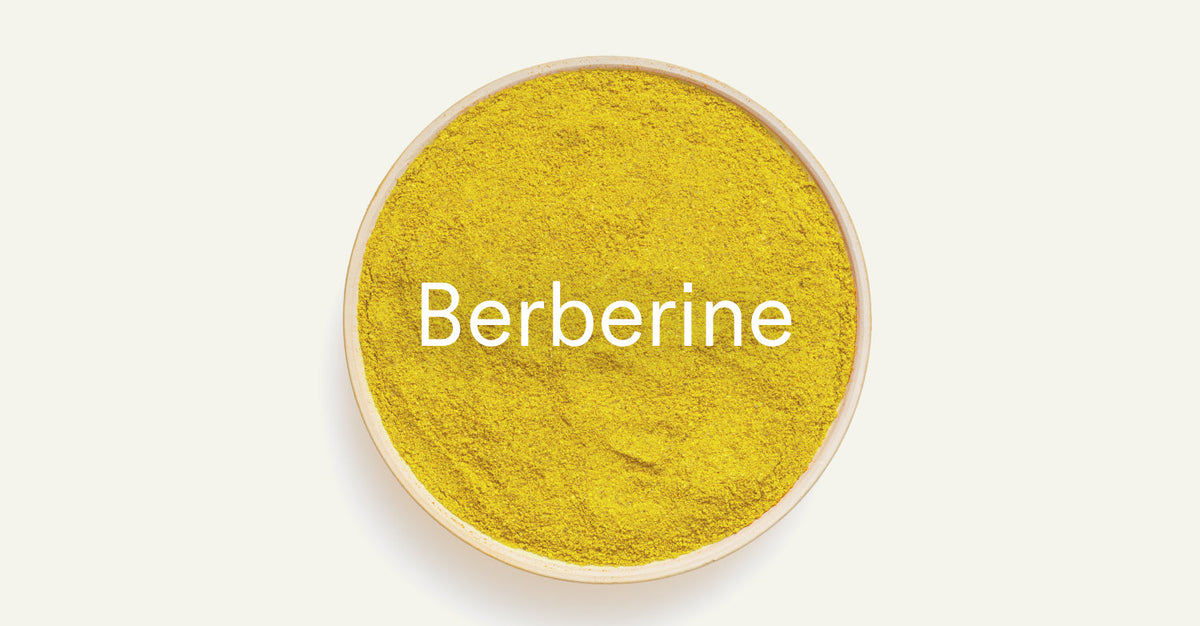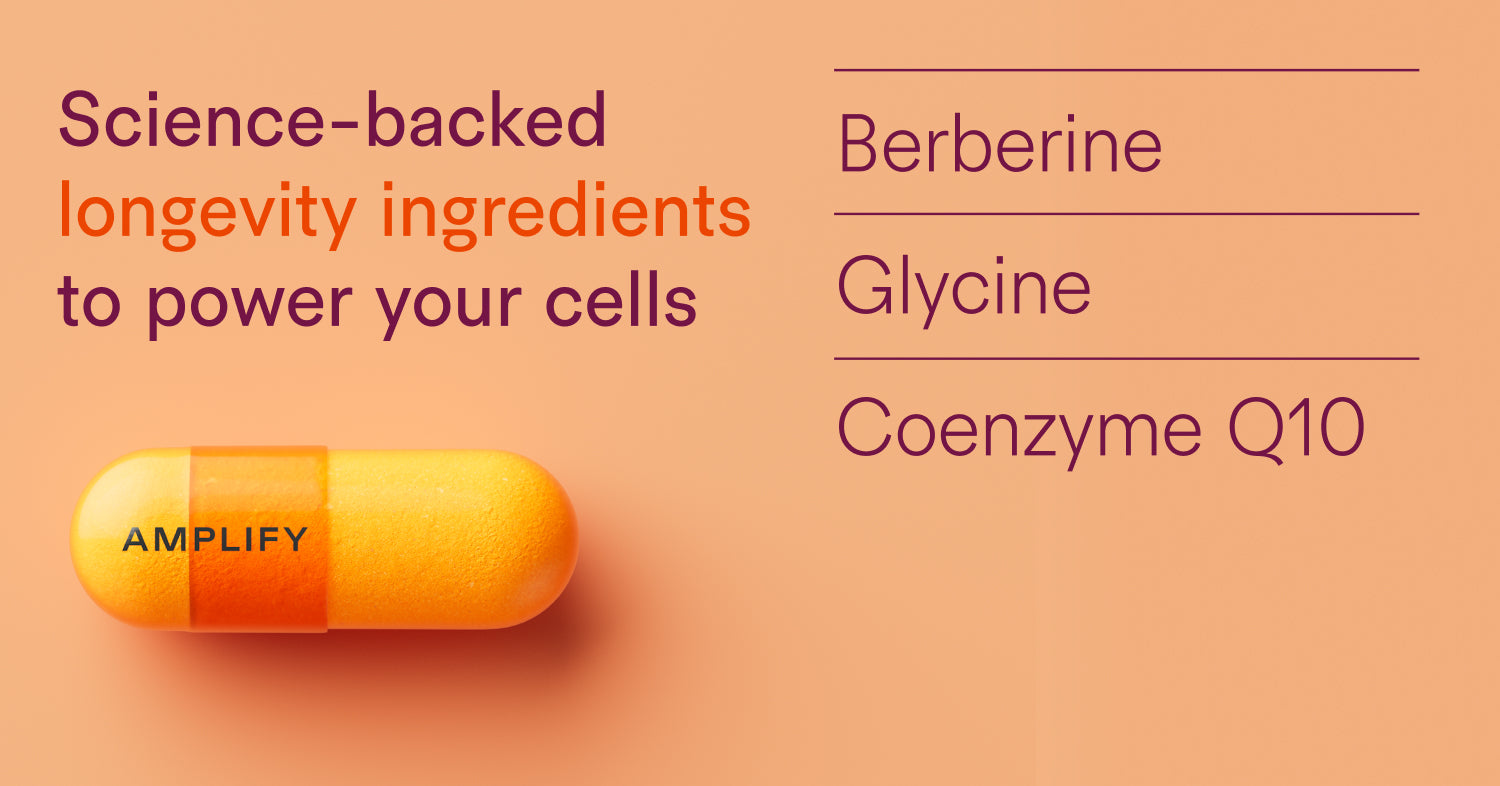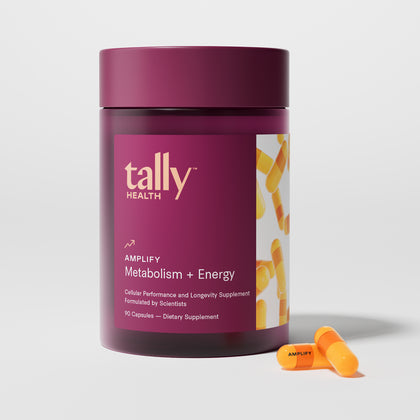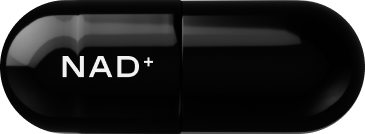

Did you know that nearly one-third of adults in the United States are grappling with metabolic syndrome [1]? Research shows how metabolic dysfunction can alter and even accelerate aging, acting as a springboard for other chronic diseases [2]. But what if there was a substance rooted in centuries-old medicinal traditions that could help navigate this issue?
Learn more about this exciting naturally occurring chemical, its important benefits, and why it was chosen as a key ingredient in Amplify by Tally Health.
Welcome to the world of berberine

Centuries ago, the traditional practices of Eastern medicine discovered the power of a unique compound—berberine—harvested from the bark, roots, or stems of plants such as the goldenseal and European barberry. Berberine is also found in tree turmeric and has been used in traditional Chinese medicine as a plant extract for centuries. But it is only now that we are beginning to fully comprehend its health potential. So, what can berberine offer us, particularly regarding metabolic health, and as a dietary supplement?
Lifestyle factors such as diet, physical inactivity, and stress are key risk factors for developing insulin resistance and metabolic syndrome.
Berberine helps improve blood sugar levels and may serve as a protective shield against and as a therapeutic aid for certain chronic conditions [3]. Clinical research has reported that berberine can improve blood sugar metabolism in humans, including in patients with type 2 diabetes [4].
The benefits of berberine for insulin resistance and insulin sensitivity

Have you noticed the growing buzz surrounding berberine’s contributions to metabolic health? What about berberine has researchers and now mainstream media so riveted?
First, berberine can decrease blood sugar levels, including hemoglobin A1Cc—a critical aging biomarker that reveals your average blood sugar levels over the past three months [4]. Berberine is effective in controlling blood sugar levels and regulating blood sugar, and it reduces insulin resistance and improves insulin sensitivity. Secondly, berberine has been reported to lower fasting blood insulin levels by 28.1% in patients with type 2 diabetes. Berberine helps regulate blood glucose, fasting plasma glucose, fasting glucose, plasma glucose, and blood glucose levels, and it improves glucose metabolism and glucose uptake.
Berberine’s has also been reported to offer lesser-known but equally important benefits, including,
Inducing brown fat thermogenesis (brown fat’s unique ability to use stored calories to generate heat) to combat weight gain and boost metabolism in mice [5]. Regular exercise and addressing physical inactivity are also important for metabolic health, and berberine can complement these lifestyle interventions.
Reducing low-density lipoprotein (LDL) cholesterol (“bad” cholesterol) and triglycerides (high levels cause an increased risk of heart attack and stroke) [6]. Berberine can increase HDL cholesterol (good cholesterol), lower total cholesterol, and improve overall cholesterol levels and lipid levels.
Targeting bacteria and yeast. Due to berberine’s antimicrobial properties, it could be a potential natural treatment option for gut dysbiosis (a hallmark of aging), small intestine bacterial overgrowth, and candida overgrowth [7, 8]. Berberine is a plant extract and is available as a berberine supplement or berberine supplements, and taking berberine as a dietary supplement should be done under the guidance of a healthcare provider.
Decreasing trimethylamine N-oxide, a metabolite produced by the gut microbiome, which protects against plaque formation and atherosclerosis [9].
Contributing to a significant loss of liver fat and body weight and improved serum lipid profile in those with non-alcoholic fatty liver disease [10]. Berberine has been shown to reduce waist circumference and body mass index, particularly in obese patients, supporting weight management and helping people lose weight. Studies have shown a significant decrease in metabolic symptoms and risk factors associated with metabolic syndrome.
Reduced diarrhea frequency and urgency and abdominal pain in patients with diarrhea-predominant irritable bowel syndrome [11]. Berberine has shown promise in managing metabolic symptoms and heart disease.
Reducing inflammation in the lining of the heart and blood vessels and improving vascular health, even in individuals with cardiovascular disease [12]. Berberine can help lower blood pressure, which is beneficial for those with high blood pressure, but caution is needed for individuals with low blood pressure.
Increasing endogenous insulin secretion in healthy human adults [13].
Extending lifespan, improving fur coat quality, and enhancing motor coordination in older mice [14]. Research suggests berberine's beneficial effects extend to improving life expectancy and tissue function, and its anti-inflammatory activity includes reducing senescent cell burden.
Berberine and Longevity: Berberine extends lifespan in mice and aging research

Berberine activates the AMP-activating protein kinase (AMPK) signaling pathway, the “master switch” of metabolism and nutrient sensor that regulates cellular energy. Research shows that AMPK activation decreases with age, which may cause altered metabolic regulation, increased oxidative stress and low-grade inflammation, and reduced autophagy (cellular cleanup) [15]. Many studies show that increasing AMPK activity extends lifespan in model organisms [16]. Many scientific publications including work by experts like Dr. David Sinclair at Harvard, supports the role of AMPK activation in promoting longevity and healthy aging. In addition, berberine has been reported to extend lifespan in mice [14].
Activating AMPK signaling pathways replenishes ATP (the energy currency of the cells) and boosts fatty acid oxidation, which simply means that it boosts energy and burns fat. Both berberine and coenzyme Q10 [17] (two ingredients in Amplify) help improve mitochondrial function, working together to provide more potent benefits for slowing aging and preserving vital cellular processes that often decrease with age.
Supplement with Berberine

Along with a healthy lifestyle, there are certain supplements that can also support your metabolic health. Berberine, which is one of the ingredients found in Amplify, has been shown to help support healthy blood sugar metabolism.
What is berberine?
Berberine is a naturally occurring compound extracted from plants like goldenseal, European barberry, and tree turmeric. Used for centuries in traditional Eastern medicine, it's now recognized for its powerful effects on metabolic health, including blood sugar regulation and cholesterol management.
How does berberine support metabolic health?
Berberine helps regulate blood sugar by improving insulin sensitivity, decreasing hemoglobin A1c, and lowering fasting blood insulin levels. It also supports lipid metabolism by reducing LDL cholesterol and triglycerides while increasing HDL cholesterol.
Can berberine promote longevity?
Yes. Berberine activates the AMPK signaling pathway, a key regulator of cellular energy and metabolism. Activation of AMPK has been linked to reduced inflammation, improved mitochondrial function, and lifespan extension in animal models.
Recommended Supplements
Citations
[1] National Heart, Lung, and Blood Institute. (2022.). What Is Metabolic Syndrome? Retrieved from https://www.nhlbi.nih.gov/health/metabolic-syndrome
[2] Bonomini, F., Rodella, L. F., & Rezzani, R. (2015). Metabolic Syndrome, Aging and Involvement of Oxidative Stress. Aging and Disease, 6(2), 109-120. https://doi.org/10.14336/AD.2014.0305
[3] Xu, Z., Feng, W., Shen, Q., Yu, N., Yu, K., Wang, S., Chen, Z., Shioda, S., & Guo, Y. (2017). Rhizoma Coptidis and Berberine as a Natural Drug to Combat Aging and Aging-Related Diseases via Anti-Oxidation and AMPK Activation. Aging and Disease, 8(6), 760-777. https://doi.org/10.14336/AD.2016.0620
[4] Yin, J., Xing, H., & Ye, J. (2008). Efficacy of Berberine in Patients with Type 2 Diabetes. Metabolism: Clinical and Experimental, 57(5), 712. https://doi.org/10.1016/j.metabol.2008.01.013
[5] Ilyas, Z., Perna, S., Al-thawadi, S., Alalwan, T. A., Riva, A., Petrangolini, G., Gasparri, C., Infantino, V., Peroni, G., & Rondanelli, M. (2020). The effect of Berberine on weight loss in order to prevent obesity: A systematic review. Biomedicine & Pharmacotherapy, 127, 110137. https://doi.org/10.1016/j.biopha.2020.110137
[6] Koppen, L. M., Whitaker, A., Rosene, A., & Beckett, R. D. (2017). Efficacy of Berberine Alone and in Combination for the Treatment of Hyperlipidemia: A Systematic Review. Journal of Evidence-Based Complementary & Alternative Medicine, 22(4), 956-968. https://doi.org/10.1177/2156587216687695
[7] Guo, H., Lu, S., Zhang, J., Chen, C., Du, Y., Wang, K., & Duan, L. (2023). Berberine and rifaximin effects on small intestinal bacterial overgrowth: Study protocol for an investigator-initiated, double-arm, open-label, randomized clinical trial (BRIEF-SIBO study). Frontiers in Pharmacology, 14. https://doi.org/10.3389/fphar.2023.1121435
[8] Yuan Tian, Jingwei Cai, Wei Gui, Robert G. Nichols, Imhoi Koo, Jingtao Zhang, Mallappa Anitha and Andrew D. Patterson (2019). Berberine directly affects the gut microbiota to promote intestinal farnesoid X receptor activation. Drug Metabolism and Disposition February 2019, 47 (2) 86-93; DOI: https://doi.org/10.1124/dmd.118.083691
[9] Ma, S., Tong, Q., Lin, Y., Pan, L., Fu, J., Peng, R., Zhang, X., Zhao, Z., Li, Y., Yu, J., Cong, L., Han, P., Zhang, Z., Yu, H., Wang, Y., & Jiang, J. (2022). Berberine treats atherosclerosis via a vitamine-like effect down-regulating Choline-TMA-TMAO production pathway in gut microbiota. Signal Transduction and Targeted Therapy, 7(1), 1-13. https://doi.org/10.1038/s41392-022-01027-6
[10] Och, A., Och, M., Nowak, R., Podgórska, D., & Podgórski, R. (2022). Berberine, a Herbal Metabolite in the Metabolic Syndrome: The Risk Factors, Course, and Consequences of the Disease. Molecules, 27(4). https://doi.org/10.3390/molecules27041351
[11] Chen C, Tao C, Liu Z, Lu M, Pan Q, Zheng L, Li Q, Song Z, Fichna J. A Randomized Clinical Trial of Berberine Hydrochloride in Patients with Diarrhea-Predominant Irritable Bowel Syndrome. Phytother Res. 2015 Nov;29(11):1822-7. doi: 10.1002/ptr.5475. Epub 2015 Sep 24. PMID: 26400188.
[12] Cicero, A.F.G., Baggioni, A. (2016). Berberine and Its Role in Chronic Disease. In: Gupta, S., Prasad, S., Aggarwal, B. (eds) Anti-inflammatory Nutraceuticals and Chronic Diseases. Advances in Experimental Medicine and Biology, vol 928. Springer, Cham. https://doi.org/10.1007/978-3-319-41334-1_2
[13] Zhao, M., Lu, J., Li, S., Wang, H., Cao, X., Li, Q., Shi, T., Matsunaga, K., Chen, C., Huang, H., Izumi, T., & Yang, J. (2021). Berberine is an insulin secretagogue targeting the KCNH6 potassium channel. Nature Communications, 12(1), 1-14. https://doi.org/10.1038/s41467-021-25952-2
[14] Dang, Y., An, Y., He, J., Huang, B., Zhu, J., Gao, M., Zhang, S., Wang, X., Yang, B., & Xie, Z. (2020). Berberine ameliorates cellular senescence and extends the lifespan of mice via regulating p16 and cyclin protein expression. Aging Cell, 19(1), e13060. https://doi.org/10.1111/acel.13060
[15] Salminen A, Kaarniranta K. AMP-activated protein kinase (AMPK) controls the aging process via an integrated signaling network. Ageing Res Rev. 2012 Apr;11(2):230-41. doi: 10.1016/j.arr.2011.12.005. Epub 2011 Dec 15. PMID: 22186033.
[16] Stancu, A. L. (2015). AMPK activation can delay aging. Discoveries, 3(4). https://doi.org/10.15190/d.2015.45
[17] Hernández-Camacho JD, Bernier M, López-Lluch G, Navas P. Coenzyme Q10 Supplementation in Aging and Disease. Front Physiol. 2018. 9:44. https://doi.org/10.3389/fphys.2018.00044











